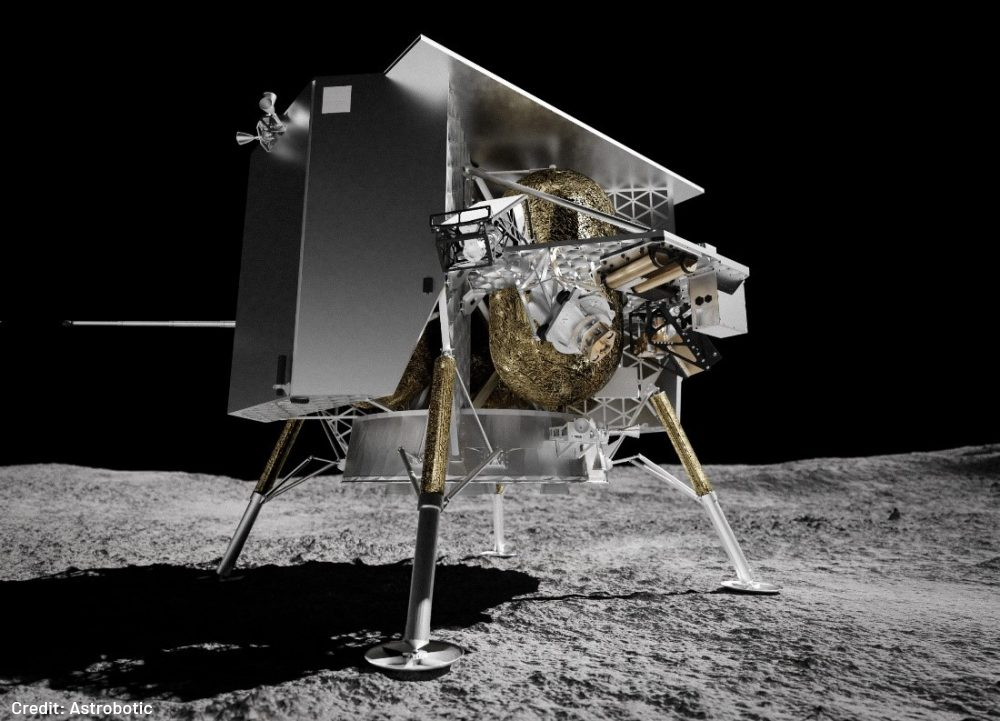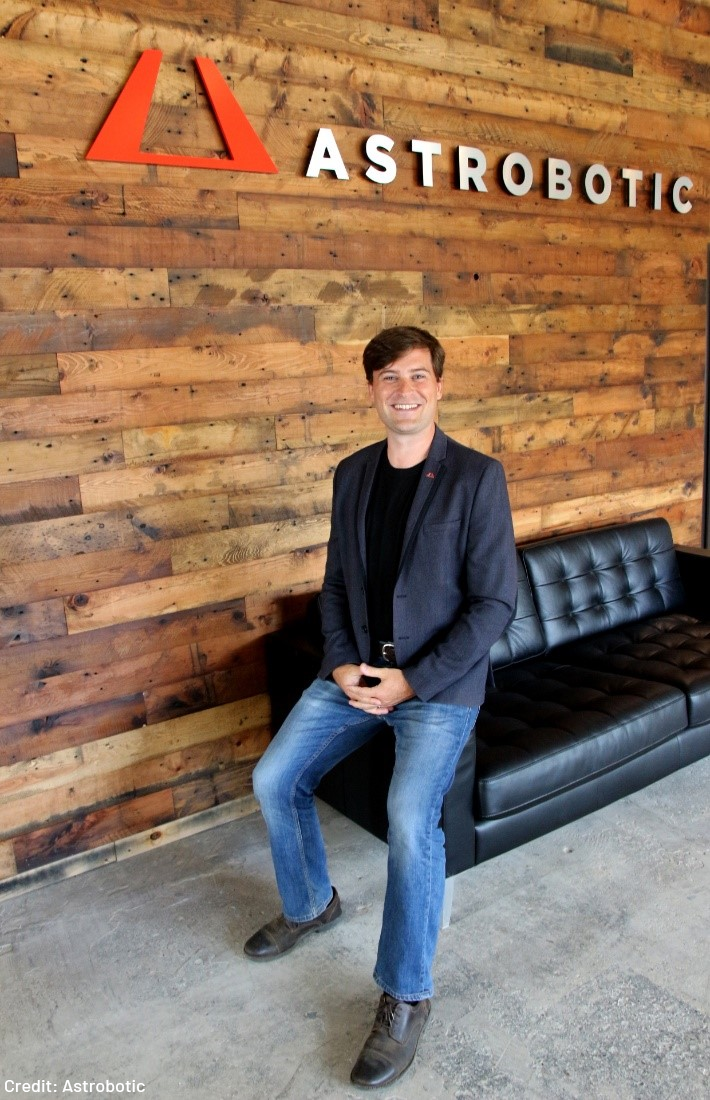To the Moon and Back with Astrobotic in Pittsburgh

Pittsburgh is the kind of place that keeps you on your toes. At the forefront of what’s next — for over two centuries — this region has produced some of the most exciting discoveries in the U.S. and redefined innovation around the world. Across sectors, from space to robotics and AI, advanced manufacturing, and more, Pittsburgh businesses are unafraid to rethink the norm. And, in fact, they do so boldly.
As big dreamers, initiators and problem solvers, Pittsburghers don’t just shoot for the moon figuratively. They literally dream up, design, construct and launch next-generation lunar lander technology. Exhibit A: Astrobotic. This Pittsburgh-based pioneer will undertake this new “giant step for mankind” on December 24, 2023, when it sends its first commercial lander, the Peregrine, to the moon.
Sixteen years in the making, Peregrine will be one of the U.S.’s first privately built landers to touch down on the moon. With thousands of hands-on deck, Astrobotic is ushering in an era of democratized space exploration centered around international collaboration.
Mission One: Astrobotic’s Peregrine
Astrobotic’s and Pittsburgh’s relationship is quintessential. Founded in 2007 above a bagel shop near Carnegie Mellon University — the fourth most innovative university in the U.S. — Astrobotic Technology Inc. began as a handful of brilliant minds with a lofty dream: redefine lunar logistics.
Looking to answer some truly complex questions, such as “How can we efficiently travel with payloads from ‘Point A’ to ‘Point B’ when A is the Earth and B is the lunar surface?” and “How can we securely transport globally renowned ideas, technologies and experiments as cargo?” the Astrobotic team had its work cut out for them.

John Thornton, Astrobotic CEO, recalls, “As I walk the halls of our new headquarters housing Astrobotic’s growing team of 218 brilliant minds, I remember the times investors laughed at our pitch deck. They could not imagine how a tiny company in Pittsburgh, Pennsylvania, could achieve an out-of-this-world dream.”
Well, no one’s laughing now. Today, Astrobotic has transformed from a tiny Pittsburgh-based company to an acclaimed aerospace powerhouse. Fueled by contract after contract – including many from NASA – Astrobotic is working on some of the most exciting modern space technology. In fact, in mid-November 2023, Pennsylvania Governor Josh Shapiro and Department of Community and Economic Development Secretary Rick Siger joined Astrobotic at the Moonshot Museum on Pittsburgh’s North Shore to announce the company’s expansion to its existing headquarters.
In renovating a $20 million facility — a five-story, 46,000-square-foot vacant building — Astrobotic plans to bring 283 new, high-tech jobs to the Pittsburgh region to work on some of the most exciting modern space technology.
From its maiden lunar mission lander, Peregrine Mission One, to its Griffin Lander — which has five times Peregrine’s carrying capacity and can accommodate large payloads like rovers and will deliver NASA’s water-hunting rover VIPER to the moon’s south pole later in 2024— and its CubeRover — backed by $20 million in NASA contracts — Astrobotic will advance American lunar exploration and planetary missions.
Investing in Regional Space Technology
Astrobotic has also played a significant role in elevating Pittsburgh’s national status as a burgeoning hub for space exploration. Earlier this year, the Keystone Space Collaborative unveiled plans to construct an eight-acre Space and Defense Innovation District on Pittsburgh’s North Side, which encompasses Astrobotic’s headquarters.
The Collaborative, a nonprofit organization dedicated to making commercial aerospace opportunities more accessible in Ohio, Pennsylvania and West Virginia, chose Pittsburgh as its mission control for this project given the breadth of space industry work already happening in southwestern Pennsylvania.

Astrobotic plans to lease a portion of its new facility’s ground floor to the Collaborative for its Keystone Innovation Center. This center will serve as a co-working space for Keystone members and house the Pittsburgh-based innovation arms of the Air Force and Space Force (AFWERX and SpaceWERX).
In addition to Astrobotic’s mission to deliver Peregrine to the moon, the Robotics Institute at Carnegie Mellon is already among the top recipients of federal grants for space technology research and the Center for Space, High-Performance, and Resilient Computing (SHREC) at the University of Pittsburgh is currently partnering with Astrobotic on its Griffin Lander which received a $200 million NASA contract to deliver the agency’s lunar rover VIPER (Volatiles Investigating Polar Exploration Rover) to the moon in late 2024.
As Justine Kasznica, the Keystone Space Collaborative’s Chairman of the Board, put it best, in Pittsburgh, “We have the perfect blend of advanced technologies for serious aerospace supplies and technology,” which will play a vital role in building a sustainable space innovation industry cluster on the city’s North Side.
One Giant Leap for Mankind and Pittsburgh
Just in time for the holidays, Astrobotic’s first Peregrine lunar lander launches from the Kennedy Space Center in Cape Canaveral, Florida, on December 24. Aboard the United Launch Alliance (ULA) Vulcan rocket, the space robotics company’s lander is vying to make history as the first American spacecraft to make a lunar landing since the Apollo missions nearly 50 years ago.
Carrying scientific instruments, technologies, mementos and payloads from six countries and dozens of scientific teams — including, the German Aerospace Center (DLR) to the Mexican Space Agency (Agencia Espacial Mexicana), Carnegie Mellon University and NASA — the Peregrine will open the door to future lunar surface systems explorations and partnerships in Pittsburgh and beyond.
As John Thornton noted, “I still think of Astrobotic as a blue-collar space agency influenced by our roots here in Pittsburgh’s North Side. Our approach is to work hard and deliver great technology, rather than make a big splash or overpromise.” Astrobotic’s commitment to substance over showmanship underscores that you don’t need to touch down on the surface of the moon to realize the expansive growth of Pittsburgh’s space technology industry.
This region’s cutting-edge space robotics and exploration investments, from Astrobotic to the Space and Defense Innovation District, are driving the next generation of lunar missions. Learn how your business can join this trending region’s aerospace industry by contacting the Pittsburgh Regional Alliance.